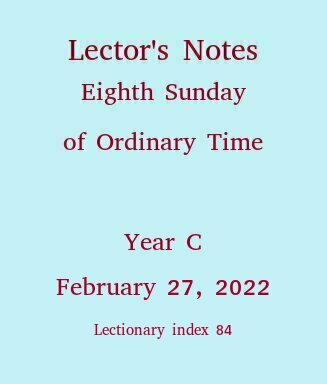

Eighth Sunday of Ordinary Time, March 2, 2025
Sirach is a book of practical wisdom for Jews living among skeptical and sometimes hostile pagans.
Addressing the Christians in Corinth, Saint Paul defended his teaching about Christ's resurrection and ours. This is the finalé of his argument.
Saint Luke reports sayings of Jesus to help his readers be good members of the gospel community, and to deal with those who are not.
The background of the book: Sirach is a very late book, when compared with the books of Moses or the prophets. By the time it appeared, Israel's great theological battles about monotheism are over, the kings have come and gone, and the Exile is a distant memory. The prophets have been silent for a long time, and many Jews are living in cities where pagans are the majorities. In these circumstances, writers asked how one should live a good life, what moral and spiritual choices should one make, what behavior is honorable in a religious person?
Proclaiming it: This is a sober, if not profound, meditation on aspects of a virtuous life. Note the structure: a series of pairs, Each pair starts with a simple observation about ordinary activities or nature. Each observation is followed by an application:
| Observation | Application
|
| Shake a sieve to separate husks | Listen to someone's speech to discern his faults
|
| The furnace tests the pot | Tribulation tests the just
|
| A tree's fruit shows the care it has had | One's speech shows his state of mind |
Express this structure in your proclamation, with pauses and variations in your tone of voice. An attentive listener, by the time you start the third pair, should be expecting another observation / application pair.
The writer's context: Remember that Corinth was a place of robust debates in philosophy and theology, and, in some quarters, of robust immorality. The Christians there had challenged Paul's authority as an apostle and his teaching about the resurrection. Paul devotes chapter 15 of this letter to laying out his doctrine of Christ's resurrection, which he here wraps up. We covered it in all the Sundays of February, this year. You'd do well to read all chapter 15 again.
Your proclamation: If you do, this passage will stand out as the powerful, dramatic summary. It deserves a powerful, dramatic proclamation. Of all the things ever taught about human life, here is where Christianity distinguishes itself finally. We assert this startling answer to life's most vexing question, "Is that all there is?" and to today's most cynical slogan, "Yada yada yada, then you die." To these we shout a resounding NO! When you quote Paul's quote of Hosea, you should sound like you're taunting death itself.
What is this which is corruptible and about to clothe itself in incorruptibility? The previous verse shows that it is the human body. What does Paul mean when he says "the power of sin is the law?" This refers to his favorite distinction between the law of Moses, as it had come to be understood and practiced by Paul's time, and the gospel. Paul said elsewhere, in effect, that the law just set a standard which no one could meet. And if only the law stands between us and God's righteousness, we're hopelessly condemned. But God's grace, which we accept by faith in Jesus, gives us an undeserved but real share in God's righteousness, so that we're really saved.
Untitled (detail), October, 2018, by a friend of the author. The artist is in recovery from addictions. On social media, she goes by the name "Freedom Painter."
This page updated February 23, 2025